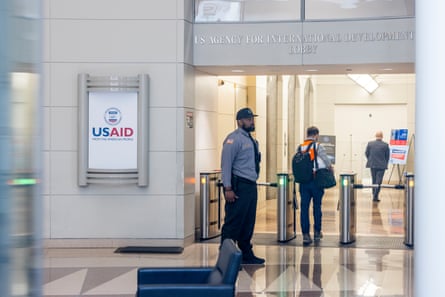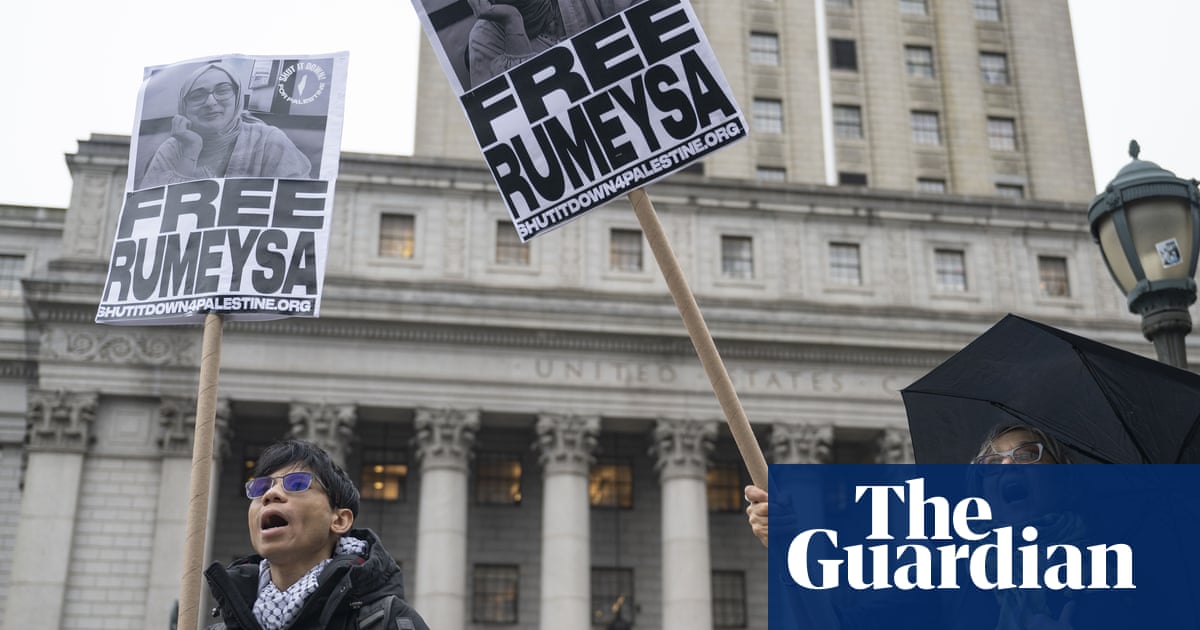USAid security personnel were defending a secure room holding sensitive and classified data in a standoff with “department of government efficiency” employees when a message was said to come directly from Elon Musk: give the Doge kids whatever they want.
Since Donald Trump’s inauguration last month, a posse of cocksure young engineers answering to Musk have stormed through Washington DC, gaining access to government computer systems as part of what Senator Chuck Schumer has called “an unelected shadow government … conducting a hostile takeover of the federal government”.
The young men, who are all under the age of 26 and have almost no government experience, have tapped into the treasury department’s federal payment system and vacuumed up employment histories at the office of personnel management (OPM). Roughly 20 Doge employees are now working out of the Department of Education, the Washington Post has reported, and have gained access to sensitive internal systems there too.
The young engineers, whose identities have been confirmed to the Guardian, wanted the same at USAid. One of them, Gavin Kliger, was a 25-year-old techie who has defended the failed attorney general nominee Matt Gaetz as a victim of the “deep state” and claimed he had left behind a seven-figure salary to join Doge and “save America”. Another, Luke Farritor, 23, was a former SpaceX intern who had been given top-level clearances to USAid systems and had requested similar to Medicare and Medicaid. A third, Jeremy Lewin, was an AI specialist also reportedly assigned to the general services administration. A superior planned to lobby the CIA for a clearance for him after he failed to gain access to a secure area.
Some US officials had begun calling the young engineers the “Muskovites” for their aggressive loyalty to the SpaceX owner. But some USAid staff used another word: the “incels”. And as early as Thursday of last week, Musk had personally placed a telephone call to a senior USAid official demanding that they be given access to the secure facilities and other key data, including badge swipes and server access.
In the Heritage Foundation’s Project 2025, USAid had been presented as a pilot test for a large-scale overhaul of the federal government that would downsize agencies and arbitrarily move federal employees to looser contracts that made them easier to fire.
“If the Trump administration is successful here, they’re going to try this everywhere else,” said Senator Andy Kim of New Jersey, a former USAid employee who came to protest alongside fired and furloughed workers outside the agency’s headquarters on Monday. “This is just the beginning.”

But it has also been a primer on how Doge operatives have inserted themselves into federal agencies and cajoled and bullied their way to access their most sensitive systems. This account of Doge’s infiltration of USAid is based on interviews with more than a dozen current and former USAid, state department and other officials briefed on the events of the last week.
Security staff initially rebuffed the engineers’ efforts to talk their way into the secure rooms, called sensitive compartmented information facilities (Scifs), because they didn’t have the necessary security clearances. But that evening, Musk phoned a senior official at USAid to demand access for his subordinates, the first of numerous calls to officials and employees of Doge at USAid that have continued into this week.
Inside the building, chaos reigned. Areas that were once declared restricted, with limitations on electronics like phones and watches, suddenly loosened their security protocols to allow in uncredentialed outsiders. Doge employees were said to obscure their identities to prevent online harassment, a tactic that was repeated at other agencies.
By Friday, things had gone further downhill. After a tense all-hands meeting with senior staff, and outsiders in the sixth-floor conference room, the young engineers rushed around the offices with their laptops, plugging cords into computers and other electronics as they gathered data from the agency.
After the meeting, Matt Hopson, a Trump appointee for USAid chief of staff abruptly resigned. Jason Gray, the acting administrator, was removed from his position. The secretary of state, Marco Rubio, was soon to announce that he was the new administrator of USAid and appoint the controversial director of foreign assistance, Peter Marocco, as his deputy. Musk was closing in on his goal.
The Doge employees had open access to rooms throughout the sixth floor, including the offices of the executive secretariat. But the Scifs were still off limits.
At USAid, a newly installed leadership was formally in charge. But the real power lay with Marocco and Doge, which was plotting how to wind down the agency, a plan that Trump endorsed on Tuesday afternoon as he confirmed that teams were backed by the White House.
“It’s all being driven through Doge right now,” said a current USAid official, adding that Doge engineers in USAid headquarters continued to field calls from Musk and Marocco on Monday. “The folks in the building are turning the system off for [USAid employees], they’ve kept a small number of people from the different bureaus to help understand what programs will be kept and not kept, what the footprint will look like.”

The tension at USAid headquarters came to a head on Saturday evening, when Doge employees demanded access to the Scif on the agency’s sixth floor. They were stopped by the agency’s top security officer, John Voorhees.
Among those present was Steve Davis, according to one current and one former USAid official. Davis, a Musk deputy, has worked with the billionaire for more than 20 years at SpaceX and Boring Co. He reportedly sometimes slept in the Twitter offices to help Musk slash costs there after he acquired it in 2022.
The argument over access to the Scif had grown verbally heated and senior Doge staff threatened to call in US marshals to gain access to the SCIF. During that standoff, according to one account, a call was again made to Musk, who as Bloomberg first reported, repeated the threat to involve the US Marshals Service.
Shortly after, Voorhees was placed on administrative leave and the Doge staffers entered the Scif. They took over the access control system and employee records. Within hours, the USAid website went down. Hundreds of employees were locked out of the system that weekend, and many still don’t know their status. (The Guardian has seen emails in which USAid administrators admit they do not know the employment states of current USAid officials).
“I’ve been furloughed, I guess?” said one contractor with 15 years of experience for the bureau for humanitarian assistance, where she had helped coordinate urgent responses in Ukraine, Gaza, Somalia and Latin America. “I don’t know what my status is but I don’t think I work here right now.”
By Monday, Kliger wrote an email to all staff at 12.42am to tell them not to bother coming into the building that day.
The incident has illustrated how Doge employees with Musk’s backing were able to override USAid leadership and bypass government procedures for accessing restricted areas with classified materials, fueling criticism that his agency is a national security risk.
“Did Secretary Rubio allow this kind of access by Musk’s employees?” said Kim. “It worries me about USAid but if it’s happening here, I’m guessing it’s probably happening at all these other national security agencies.”
Formally, Rubio has delegated responsibility to Marocco, who has been pressed by congressional staffers to give details of the changes affecting USAid and the $40bn in foreign aid it manages each year.
“The question at hand is who’s in charge of the state department?” Senator Brian Schatz told the Guardian. “So far the answer has been Pete Marocco.”
Doge did not respond to questions about what security clearances, if any, the engineers held. “No classified material was accessed without proper security clearances,” wrote Katie Miller, the Doge spokeswoman, on social media.
But Scifs are regulated by a strict protocol and it is unclear who could have verified the Doge employees’ credentials and filed the necessary paperwork to allow them to enter.
Inside the building, staffers said that Doge cultivated a culture of fear.
“It’s an extreme version of who do you trust, when and how?” said Kristina Drye, a speechwriter at the agency, who watched dozens of senior colleagues escorted out of the building by security. “It felt like the Soviet stories that one day someone is beside you and the next day they’re not.”
People started meeting for coffee blocks away because “they didn’t feel safe in the coffee shops here to even talk about what’s going on,” she added.
“I was in the elevator one morning and there was an older lady standing beside me and she had glasses on and I could see tears coming down under her glasses and before she got off her elevator staff she took her glasses off, wiped her eyes, and walked out,” she said. “Because if they see you crying, they know where you stand.”

 3 months ago
41
3 months ago
41













































